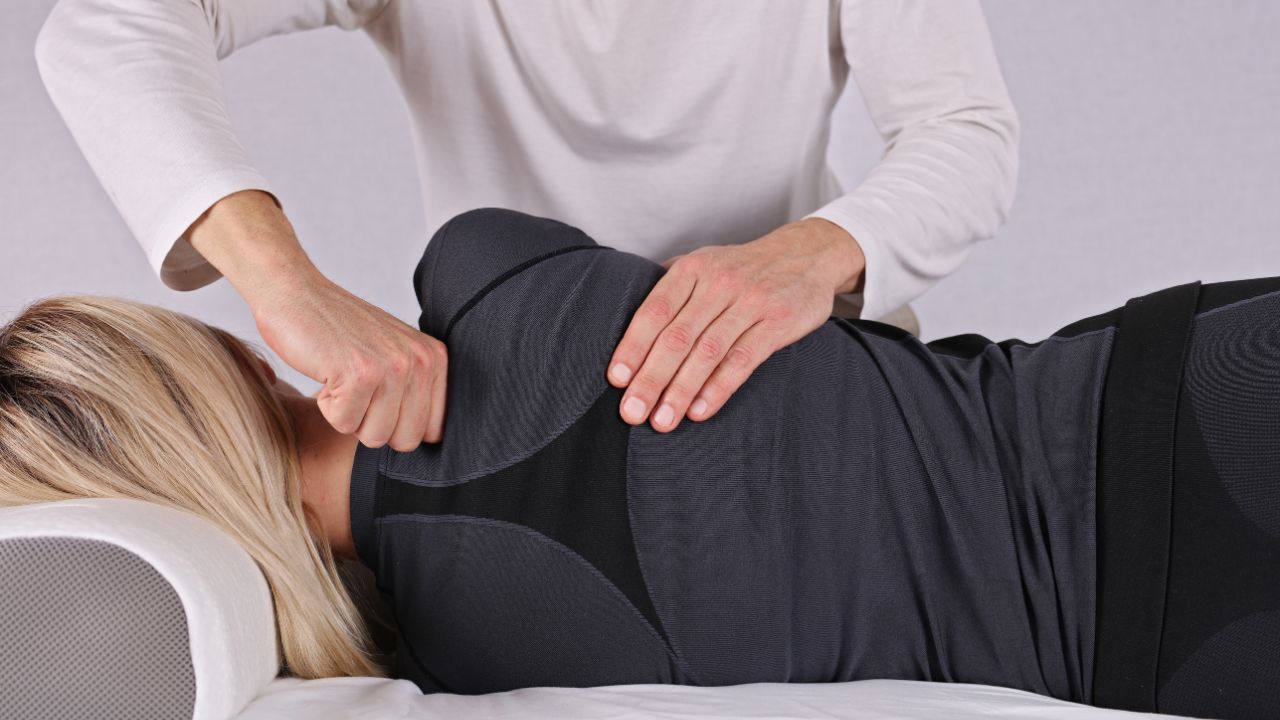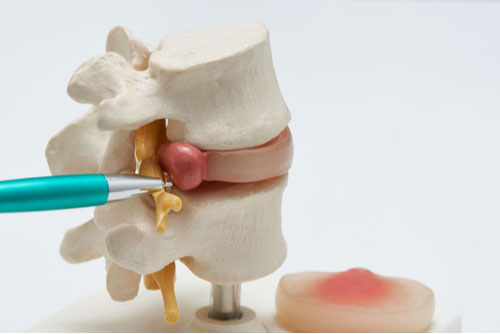Suffering herniated discs can be painful. They may cause muscle weakness, restrain your mobility, and interfere with your everyday activity. However, you don’t have to push through the discomfort. Our doctors can find a Naples herniated disc treatment method that will help you feel better than ever. Treatments for herniated discs range from surgical treatments to pain medication and other alternative and complementary therapies.
Herniated disc treatment at Naples Community Injury Center offers a variety of pain relief and management solutions. Our doctors, chiropractors, and physical therapists in Naples are dedicated to finding a treatment plan that is unique to your specific needs.
Call us today to schedule an appointment.
Table of Contents
Surgical Herniated Disc Treatment
Microdiscectomy is a spinal decompression surgical procedure that relieves pain from herniated discs by removing small fragments of the disc, bone, and ligament to free the compressed nerve. This procedure is a minimally invasive surgery that requires only a small incision to the spine.
Most herniated disc patients will not require surgery, though. As such, medical professionals usually recommend trying other alternative treatments. However, some severe symptoms, like motor weakness, may push a doctor to advise surgery without seeking other alternative treatments.
Alternative and Complementary Herniated Disc Treatments

Alternative and complementary treatments are sometimes used to treat a herniated disc in combination with or instead of surgery—it depends on the severity of the herniated disc. These types of treatments aim to manage pain stemming from the herniated disc. They could involve specific exercises, pain relief medications, or various types of manual therapy.
Manual and Physical Therapy
Manual treatments are based on physical stimuli that produce muscle relaxation, including:
- Massages
- Heating and cooling techniques
- Ultrasound therapy
- Exercise, Relaxation, and Positioning
While it may seem counterintuitive, medical professionals advise people with herniated discs to stay active. Refraining from physical activity will cause your muscles to weaken and potentially lead to other problems. However, while exercise can help with mobility, if you push yourself past your limits, the pain from the herniated disc could worsen.
Pain is caused by how your brain perceives a damaging stimulus. While you might not be able to will yourself out of it, you may be able to reduce your pain through relaxation exercises. The effectiveness of this type of treatment will depend on the severity of the herniated disc.
When the pain is severe, you can lie down in a position that puts the least amount of strain on your back. This can provide temporary relief until your pain lessens or you find a more effective treatment.
Pain Medication

Most medications that subdue pain from a herniated disc are either anti-inflammatory drugs or painkillers. When used as prescribed, medication can be an effective tool for pain management.
Non-Steroidal Anti-Inflammatory Drugs (NSAIDs)
Over-the-counter drugs include diclofenac, ibuprofen, and naproxen. These types of drugs are used as an anti-inflammatory and for pain relief.
Acetaminophen
Over-the-counter drugs are more easily tolerated than NSAIDs, especially for people with asthma or stomach problems. Common acetaminophen includes Tylenol and Excedrin.
Opioids
A strong prescription pain medication that you should only take under medical supervision. Opioids can be addictive and cause severe side effects when not taken as a medical professional instructs.
Steroids
A prescription drug that reduces inflammation and can relieve pain. Steroids can also increase the risk of certain medical problems such as stomach ulcers, osteoporosis, glucose metabolism disorders, infections, glaucoma, and skin problems.
Muscle Relaxants
A prescription sedative that causes your muscles to relax. Side effects include fatigue and drowsiness. Benzodiazepine muscle relaxants can lead to addiction when taken for longer than two weeks.
Anticonvulsants
A prescription medication that’s usually prescribed for epilepsy treatment, but some anticonvulsants aim to treat nerve pain. Side effects include drowsiness and fatigue.
Antidepressants
A prescription medication that is usually used to treat depression can be used to treat many other physical and mental health problems. Some antidepressants are approved for treating pain.
The Biology of a Herniated Disc

A herniated disc is when an intervertebral disc bulges through an abnormal opening. According to Columbia University Irving Medical Center, intervertebral discs are named after their disc-like shape and act as cushions between your bones and your spine.
The Vertebral Column
Your vertebral column or backbone consists of 33 bones or vertebrae. Intervertebral discs separate each vertebra. Your ligaments, facet joints, and intervertebral discs work together to connect the vertebrae and maintain your spine’s alignment and curvature, which are important for mobility.
The Spine
Herniated discs can occur in any of the four regions of the spine, which include:
- Cervical spine: Neck.
- Thoracic spine: Upper and middle back.
- Lumbar spine: Lower back.
- Sacrococcygeal: Lowest part of the spine.
When the outer wall of a disc weakens and bulges outward, it causes a herniated disc. In some cases, the disc can rupture its outer wall under large amounts of pressure.
A herniated disc can cause pain in its surrounding area. You will experience discomfort in different areas of your body depending on where the herniated disc is on your spine. For instance, if a herniated disc is in the cervical spine in your neck, the pain can also spread to your shoulders, per Mayo Clinic.
How Are Herniated Discs Diagnosed?
When you visit our office for physical therapy or chiropractic care, we will need to discuss your condition and diagnose you before we can create a custom treatment plan to address your herniated disc pain. To diagnose you, we generally begin with a conversation about your symptoms, which may include:
- Pain in your legs, arms, lower back, thigh, calf, buttocks, or shoulder
- Numbness or tingling in the affected body part
- Muscle weakness
Some patients also suffer from herniated discs that display no symptoms, so we will often need to thoroughly assess your condition before we arrive at a diagnosis. We may order one of the following medical exams:
- X-rays: Although X-rays don’t pick up herniated discs, they can rule out any other common causes of the symptoms you’re experiencing.
- CT scan: A series of X-rays taken from different directions to show a cross-sectional view of your spine.
- Myelogram: Your doctor will inject dye into your spinal fluid before a CT scan to show any spots along the spine where you may be feeling pressure caused by herniated discs.
- MRI: This type of scan is often used to determine the exact location of your herniated disc.
We could also recommend a nerve condition study or electromyogram (EMG) if we need to learn more about the location of your nerve compression.
Causes of Herniated Discs and How to Prevent Them
While herniated discs could occur without being triggered, some factors that could increase your chances of suffering a herniated disc include:
- Excess body weight
- Genetic predisposition
- Sedentary lifestyle
- Smoking, which lowers oxygen supply to your discs
- Long periods spent driving, as the vibration of a car can cause pressure on your spine
- Jobs that require repetitive motions
You can try to reduce your risk of suffering from disc herniation by:
- Participating in frequent exercise
- Keeping good posture
- Maintaining a healthy weight
- Quitting smoking
Our team can also help you understand how to maintain a healthy lifestyle and avoid suffering from a herniated disc.
Benefits of Seeking Chiropractic Care or Physiotherapy for Your Herniated Disc
Making an appointment at Naples Community Injury Center gives you access to a team that truly cares about your well-being. When you visit us, you’ll experience the benefits of seeking chiropractic and physiotherapy treatments for your herniated disc. These benefits include:
- You get a treatment plan catered to your specific needs. We will recommend chiropractic treatments and other treatment options to help you manage your pain and feel better.
- We offer solutions that can provide long-term pain relief. Generally, you won’t just visit the chiropractor one time. We offer medical advice and recommend exercises that can keep you feeling your best in the long term.
- It allows you to monitor your progress and injury recovery. As your condition improves, your chiropractor can recommend new treatments to help you continue progressing.
Naples Community Injury Center Can Help You Heal From Your Herniated Disc Pain
At Naples Community Injury Center, we provide a variety of treatments for patients with herniated discs, including surgery and other alternative treatments. With a collective experience of over 60 years, we are confident that we can help find the right pain management treatment that will reduce your pain, increase your mobility, and result in higher satisfaction and overall well-being.
If you are struggling with a herniated disc, get in touch with Naples Community Injury Center today. Our team of Naples herniated disc treatment specialists can tell you more about how we can help you manage your pain.

